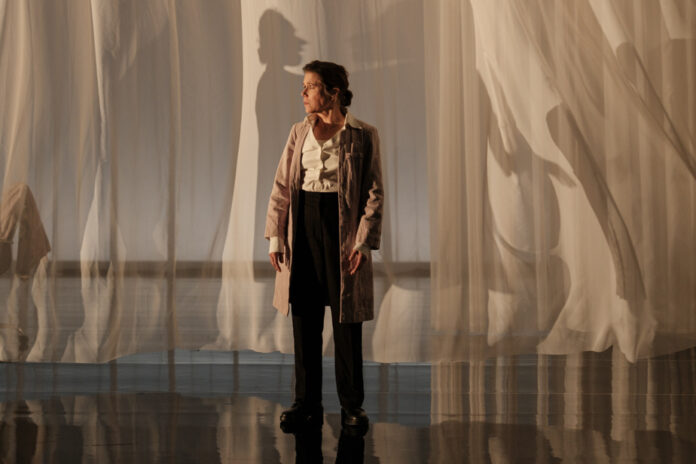Times are tough for thinkers. Descartes’ cogito, “I think therefore I am,” became “I think therefore I am right.” Humanity is divided into tribes and subgroups, finely defined by their beliefs and multiple identities.
This is what Rachel Wolff will painfully learn in Docteure, a punchy play by Robert Icke, playing at Duceppe. With the masterful Pascale Montpetit in the role of a head doctor, devoted to her work and to science! For more than two hours, this show constantly keeps our minds awake. And sparks great discussions when the curtain falls.
When a priest arrives at her hospital to give extreme unction to a dying teenager, Doctor Wolff abruptly rebuffs him, under the pretext that no note in the file indicates that her patient is… Catholic. A bellicose exchange pitting faith and reason follows.
However, the priest records the heated exchange on his phone. The recording will be broadcast on social networks. Then the affair will snowball. Confronted by colleagues who fear her attitude will harm the medical institute’s reputation (and funding for an expansion project), Dr. Wolff calls the incident “a storm in a teacup.”
An online petition followed which asserted that “Christian patients need Christian doctors”… Wolff, of Jewish faith, realized that his values and medical ethics no longer held up in the face of the crisis. She will resign “temporarily”.
Docteure, created in London in 2019, is freely adapted from Professor Bernhardi, a little-known play written a century ago by the Austrian Arthur Schnitzler. Its adaptation illustrates that the more things change… the more the state of the world remains the same. Of course, the issues are evolving, but the debate too often remains sterile. Fanaticism, religious extremism, political chicanery, identity madness… The human court is overflowing with examples where the Cartesian mind must retreat in the face of ideological excesses.
Docteure opens with a question of medical ethics to better address various current issues: abortion, racial and postcolonial divisions, the quest for identity and, of course, the place of religion. The author creates a “moral thriller” in which the multiplicity of points of view is exposed. It brings back the conflicts of ideas and values between the protagonists. They face each other as in a sporting contest. Except that there are no winners or losers here.
In a very successful scene, Rachel is invited to a public affairs show, Au coeur du débat. Trapped in the middle of a hostile forum, formed by a Catholic anti-abortion lawyer, a Jewish congressman, a woke activist, an expert on unconscious bias, a postcolonial university researcher, Wolff will not be able to argue with her television adversaries . She will lose this false debate. When reason leaves, gibberish becomes the common language and triumphs.
Marie-Ève Milot very skillfully staged this production, without intermission or downtime. Except for its finale, a bit of a failure, where it juxtaposes a powerful dialogue, with Rachel and the father, lost in the background, with an anonymous multitude crossing the stage, from courtyard to garden, as in a Pina Bausch show. .
This is our only downside. Because this show is a must-see! All the performers are fantastic! Special mention to Pascale Montpetit. The actress delivers an extraordinary performance in the demanding role of Dr. Wolff. A woman for whom medicine is a balm for the suffering of humanity. Even at the sacrifice of his personal life.















